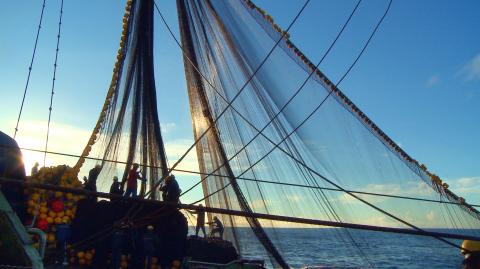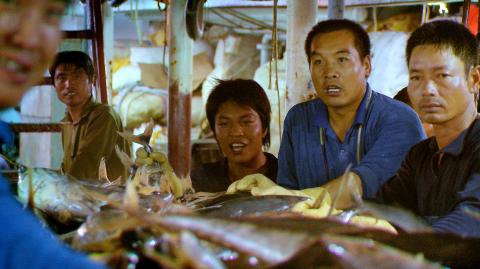The fishing industry takes center stage in Trapped at Sea, Lost in Time (海上情書), a two-hour documentary that took directors Kuo Chen-ti (郭珍弟) and Ke Neng-yuan (柯能源) six years to complete. But don’t expect to see slave laborers or Greenpeace.
The film instead provides a rare glimpse into the lives of mariners who often spend years at sea, offering an intimate and honest portrait of these seafaring men, their back-breaking work, aspirations and dreams.
The film opens in Kaohsiung’s Cianjhen District (前鎮), where life revolves around tuna fishing, with a pregnant Shu-fen (淑芬) waving goodbye to her husband Yeh Kuo-lung (葉國隆), a sea captain who is about to set out on a three-year voyage in the South Pacific Ocean. Yeh is joined by three seasoned fishermen and dozens of deckhands on a commercial fishing boat.

Photo courtesy of Activator Marketing Company
As Yeh departs, a woman is heard reading a love letter, as if she is writing to her man far away from home. It’s a voice that returns from time to time, providing the film’s resonant, emotional core.
On the high seas, though, it is a man’s world, which caused problems for Kuo, a woman, who reportedly had a hard time finding a fishing company willing to break the taboo and allow her on board.
The Taiwanese officers and deckhands, mostly recruited from China and Southeast Asian countries, primarily catch yellowfin and skipjack tuna as well as slender sprats. Three fishing vessels, each equipped with state-of-the-art fishing gear, form the fleet, and during a good day catch up to 300 tonnes of fish.

Photo courtesy of Activator Marketing Company
The directors document the mariner’s daily routine, and there is no shortage of excitement in watching how the entire operation, which involves a one-man helicopter, is closely coordinated in order to catch a school of tuna. Contrary to their weather-beaten, hard-boiled image, the seamen appear surprisingly caring and tender.
The film catches moments where they banter, cut each others hair, comfort those who are homesick and attend to those who are injured.
When taking a short rest at ports, the mariners often spend time skyping their families at Internet cafes or seeking warmth in the arms of sex workers. Yeh Ming-chih (葉明志), an officer, learns to speak English so that he can woo women from different parts of the globe.
Apart from the Taiwanese, the film crew interviewed only Chinese workers, likely due to the language barrier. Without exception, they all hail from poor towns and villages, spending years at sea so as to provide a better life for their families back home. Some plan to save enough money and quit the seafaring life; others say they want to find a woman and settle down.
Eventually, home is where every seaman longs to return in Trapped at Sea, Lost in Time, whether it means a house full of children and an understanding wife or a dream for the future.

The canonical shot of an East Asian city is a night skyline studded with towering apartment and office buildings, bright with neon and plastic signage, a landscape of energy and modernity. Another classic image is the same city seen from above, in which identical apartment towers march across the city, spilling out over nearby geography, like stylized soldiers colonizing new territory in a board game. Densely populated dynamic conurbations of money, technological innovation and convenience, it is hard to see the cities of East Asia as what they truly are: necropolises. Why is this? The East Asian development model, with

June 16 to June 22 The following flyer appeared on the streets of Hsinchu on June 12, 1895: “Taipei has already fallen to the Japanese barbarians, who have brought great misery to our land and people. We heard that the Japanese occupiers will tax our gardens, our houses, our bodies, and even our chickens, dogs, cows and pigs. They wear their hair wild, carve their teeth, tattoo their foreheads, wear strange clothes and speak a strange language. How can we be ruled by such people?” Posted by civilian militia leader Wu Tang-hsing (吳湯興), it was a call to arms to retake

This is a deeply unsettling period in Taiwan. Uncertainties are everywhere while everyone waits for a small army of other shoes to drop on nearly every front. During challenging times, interesting political changes can happen, yet all three major political parties are beset with scandals, strife and self-inflicted wounds. As the ruling party, the Democratic Progressive Party (DPP) is held accountable for not only the challenges to the party, but also the nation. Taiwan is geopolitically and economically under threat. Domestically, the administration is under siege by the opposition-controlled legislature and growing discontent with what opponents characterize as arrogant, autocratic

When Lisa, 20, laces into her ultra-high heels for her shift at a strip club in Ukraine’s Kharkiv, she knows that aside from dancing, she will have to comfort traumatized soldiers. Since Russia’s 2022 invasion, exhausted troops are the main clientele of the Flash Dancers club in the center of the northeastern city, just 20 kilometers from Russian forces. For some customers, it provides an “escape” from the war, said Valerya Zavatska — a 25-year-old law graduate who runs the club with her mother, an ex-dancer. But many are not there just for the show. They “want to talk about what hurts,” she